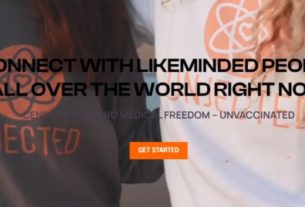Yes! You can say No! Here are some thoughtful documents to help you do so…
COVID-19 Vaccination Exemption Document
Letters & Forms from America’s Frontline Doctors
Letters & Forms from UK-based The People’s Lawyer (Scroll to “Universal Rights and the Sanctity of Life”)
There is reference here to the Nuremberg Code as well as the United Nations Educational, Scientific, and Cultural Organization’s (UNESCO) Universal Declaration on Bioethics and Human Rights (UDBHR).
The Nuremberg Code (listed below) is arguably the most significant document pertaining to clinical research ethics. It defines “Permissible Medical Experiments” and constituted the formal justification for the conviction of 15 Nazi doctors for crimes against humanity for conducting medical experiments without the consent of their subjects.
- The voluntary consent of the human subject is absolutely essential. This means that the person involved should have legal capacity to give consent; should be so situated as to be able to exercise free power of choice, without the intervention of any element of force, fraud, deceit, duress, overreaching, or other ulterior form of constraint or coercion; and should have sufficient knowledge and comprehension of the elements of the subject matter involved as to enable him to make an understanding and enlightened decision. This latter element requires that before the acceptance of an affirmative decision by the experimental subject there should be made known to him the nature, duration, and purpose of the experiment; the method and means by which it is to be conducted; all inconveniences and hazards reasonably to be expected; and the effects upon his health or person which may possibly come from his participation in the experiment. The duty and responsibility for ascertaining the quality of the consent rests upon each individual who initiates, directs, or engages in the experiment. It is a personal duty and responsibility which may not be delegated to another with impunity.
- The experiment should be such as to yield fruitful results for the good of society, unprocurable by other methods or means of study, and not random and unnecessary in nature.
- The experiment should be so designed and based on the results of animal experimentation and a knowledge of the natural history of the disease or other problem under study that the anticipated results will justify the performance of the experiment.
- The experiment should be so conducted as to avoid all unnecessary physical and mental suffering and injury.
- No experiment should be conducted where there is an a priori reason to believe that death or disabling injury will occur; except, perhaps, in those experiments where the experimental physicians also serve as subjects.
- The degree of risk to be taken should never exceed that determined by the humanitarian importance of the problem to be solved by the experiment.
- Proper preparations should be made and adequate facilities provided to protect the experimental subject against even remote possibilities of injury, disability, or death.
- The experiment should be conducted only by scientifically qualified persons. The highest degree of skill and care should be required through all stages of the experiment of those who conduct or engage in the experiment.
- During the course of the experiment the human subject should be at liberty to bring the experiment to an end if he has reached the physical or mental state where continuation of the experiment seems to him to be impossible.
- During the course of the experiment the scientist in charge must be prepared to terminate the experiment at any stage, if he has probable cause to believe, in the exercise of the good faith, superior skill and careful judgment required of him that a continuation of the experiment is likely to result in injury, disability, or death to the experimental subject.
Letter template from the National Catholic Bioethics Center
Title VII of the Civil Rights Act of 1964 “Prohibits:
- treating applicants or employees differently based on their religious beliefs or practices – or lack thereof – in any aspect of employment, including recruitment, hiring, assignments, discipline, promotion, and benefits (disparate treatment);
- subjecting employees to harassment because of their religious beliefs or practices – or lack thereof – or because of the religious practices or beliefs of people with whom they associate (e.g., relatives, friends, etc.);
- denying a requested reasonable accommodation of an applicant’s or employee’s sincerely held religious beliefs or practices – or lack thereof – if an accommodation will not impose more than a de minimis cost or burden on business operations; 1 and,
- retaliating against an applicant or employee who has engaged in protected activity, including participation (e.g., filing an EEO charge or testifying as a witness in someone else’s EEO matter), or opposition to religious discrimination (e.g., complaining to human resources department about alleged religious discrimination).”
“Title VII protects all aspects of religious observance and practice as well as belief and defines religion very broadly for purposes of determining what the law covers. For purposes of Title VII, religion includes not only traditional, organized religions such as Christianity, Judaism, Islam, Hinduism, and Buddhism, but also religious beliefs that are new, uncommon, not part of a formal church or sect, only subscribed to by a small number of people, or that seem illogical or unreasonable to others. An employee’s belief or practice can be “religious” under Title VII even if the employee is affiliated with a religious group that does not espouse or recognize that individual’s belief or practice, or if few – or no – other people adhere to it. Title VII’s protections also extend to those who are discriminated against or need accommodation because they profess no religious beliefs.
“Religious beliefs include theistic beliefs (i.e. those that include a belief in God) as well as non-theistic ‘moral or ethical beliefs as to what is right and wrong which are sincerely held with the strength of traditional religious views.’ Although courts generally resolve doubts about particular beliefs in favor of finding that they are religious, beliefs are not protected merely because they are strongly held. Rather, religion typically concerns ‘ultimate ideas’ about ‘life, purpose, and death.’ Social, political, or economic philosophies, as well as mere personal preferences, are not ‘religious’ beliefs protected by Title VII.”
The very foundational document of the United States of America, The Declaration of Independence, asserts that, “We hold these truths to be self-evident, that all men are created equal, that they are endowed by their Creator with certain unalienable Rights, that among these are Life, Liberty and the pursuit of Happiness. — That to secure these rights, Governments are instituted among Men, deriving their just powers from the consent of the governed, — That whenever any Form of Government becomes destructive of these ends, it is the Right of the People to alter or to abolish it, and to institute new Government, laying its foundation on such principles and organizing its powers in such form, as to them shall seem most likely to effect their Safety and Happiness.”



